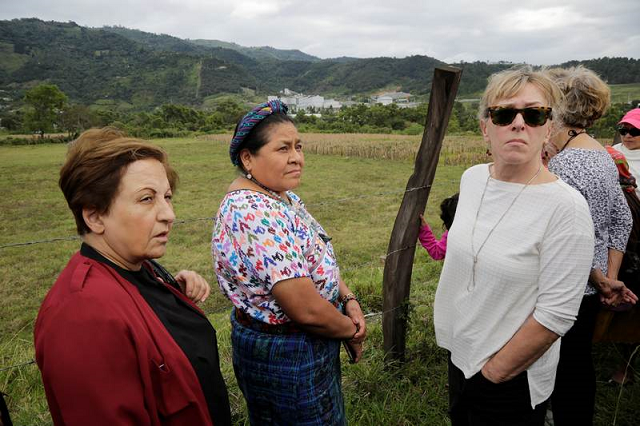Iran arrested 860 journalists in post-revolution decades: watchdog
Reporters Without Borders say the confidential records for the period from 1979-2009 were provided by whistleblowers

Nobel Peace Prize winners (from left) Shirin Ebadi of Iran, Rigoberta Menchu of Guatemala and Jody Williams of US during a march against mining in Casillas, Guatemala October 26, 2017. Ebadi now lives in exile after she and other women were forbidden from working as judges following the 1979 Iran-revolution. PHOTO: AFP
Reporters Without Borders said the confidential records for the period from 1979-2009 were provided by whistleblowers to coincide with Tehran's marking the 40th anniversary of the Islamic republic's founding this week.
The file contains some 1.7 million records of judicial procedures, and although people's professions are not listed, RSF said researchers spent months to compile and verify the names of 860 journalists or citizen-journalists who were arrested or imprisoned.
Iranian envoy calls for opening new border gates
At least four of them were executed, it said.
"The very existence of this file and its millions of entries show not only the scale of the Iranian regime's mendacity for years when claiming that its jails were holding no political prisoners or journalists, but also the relentless machinations it used for 40 years to persecute men and women for their opinions or their reporting," the rights group's secretary general Christophe Deloire said in a statement.
He added that the findings would be submitted to the UN High Commissioner for Human Rights Michelle Bachelet.
Prominent journalists in the file include Farj Sarkhohi, editor of a political magazine who Tehran said disappeared en route to Germany in 1996.
"The regime staged a press conference at the airport at which it produced Sarkhohi and claimed he had just returned from Turkmenistan. In reality, he had just spent two months in prison," the report said.
It also said Iranian-Canadian photographer Zahra Kazemi died of beating injuries at Tehran's Evin prison in 2003, after taking pictures of families waiting outside the facility.
US supports 'dictators, butchers and extremists' in Middle East, says Iran
Iran has denied her killing, with an official report on her death failing to disclose the cause of death.
The report also claims that over 6,000 people were arrested for protesting against the re-election of former president Mahmoud Ahmadinejad in 2009, accused of "action against national security".
Other records in the leaked files include those of human rights advocates, notably Shirin Ebadi, a lawyer who was awarded the Nobel Peace Prize in 2003 and who now lives in exile after she and other women were forbidden from working as judges following the 1979 revolution.



















COMMENTS
Comments are moderated and generally will be posted if they are on-topic and not abusive.
For more information, please see our Comments FAQ